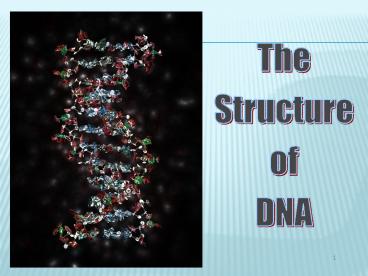The - PowerPoint PPT Presentation
Title:
The
Description:
* * All life on earth uses a chemical called DNA to carry its genetic code or blueprint. In this lesson we be examining the structure of this unique molecule. {Point ... – PowerPoint PPT presentation
Number of Views:86
Avg rating:3.0/5.0
Title: The
1
- The
- Structure
- of
- DNA
2
Cut, color and glue the illustration of the DNA
double helix onto the output page of your
notebook. Do the following
- Label the components that make up the DNA.
- 2. Draw a box surrounding one nucleotide of the
double helix and label this.
3
All life on earth uses a chemical called DNA to
carry its genetic code or blueprint. In this
lesson we be examining the structure of this
unique molecule.
By the way, can you make out what this is?
4
Why do we study DNA? Why is it important?
- We study DNA for many reasons, e.g.,
- its central importance to all life on Earth/
identifies organisms, - HowStuffWorks Videos "Solved DNA Analysis"
- medical benefits such as cures for diseases or
risks for genetic diseases - http//www.redorbit.com/news/video/science/5/dna_t
esting_for_everyone/25395/index.html
5
Essential Questions
- How can we tell if organisms are related to each
other and how organisms change over time?
- How is DNA similar to the Morse Code or any other
secret codes?
6
DNA??????
- DDeoxyribo
- NNucleic
- AAcid
- Deoxyribonucleic Acid
7
What is DNA?
- DNA is often called the blueprint of life.
- In simple terms, DNA contains the instructions
for making proteins within the cell.
8
Chromosomes and DNA?
- Our genes are on our chromosomes.
- Chromosomes are made up of a chemical called DNA.
9
The Shape of DNA?
- DNA is a very long polymer.
- The basic shape is like a twisted ladder or
zipper. - This is called a double helix.
10
The Double Helix Molecule
- The DNA double helix has two strands twisted
together.
11
DNA Double Helix
12
What makes up the strand (rails) of DNA?
phosphate
- The backbone of the molecule is alternating
phosphates and deoxyribose sugar
deoxyribose
bases
13
What are the four nitrogenous bases that make up
the steps of the ladder?
DNA has four different bases
- Cytosine C
- Thymine T
- Adenine A
- Guanine G
- THESE MAKE UP THE STEPS OF THE LADDER!!!
14
nucleotide
- DNA is made up of repeating units called
nucleotides
15
What makes up the DNA Nucleotides?
16
Cut and glue the nucleotide illustration onto the
output page and label its three parts (pay close
attention to the attachments)
A.
C.
- A. Phosphate group
- B. Deoxyribose sugar
- C. Nitrogen base
B.
17
Chargaffs Rule
- DNA has specific pairing between the nitrogen
bases - Adenine must pair with Thymine
- Guanine must pair with Cytosine
- Their amounts in a given DNA molecule will be
about the same.
18
BASE-PAIRINGS
19
Two Stranded DNA
- Remember, DNA has two strands that fit together
something like a zipper. - DNA was made of 2 long stands of nucleotides
arranged in a specific way called the
Complementary Rule
20
Genetic Diversity
- Different arrangements of NUCLEOTIDES in a
nucleic acid (DNA) provides the key to DIVERSITY
among living organisms.
21
The Code of Life
- The code of the chromosome is the SPECIFIC
ORDER that bases occur. - A T C G T A T G C G G
22
QUIZ
23
- 1. Which of the following bases pairs with
adenine in DNA? - Thymine
- Guanine
- Adenine
- Cytosine
24
What is the DNA base pair rule?
2. If the template of a strand of DNA is 5'
AGATGCATC 3 ,the complementary strand will be
F 3' TCTACGTAG 5' G 5' CTACGTAGA 3' H 3'
AGATGCATC 5' J 5' AGACGTCTA 3'
25
3. In DNA, which of the following determines the
traits of an organism?
- F Amount of adenine
- G Number of sugars
- H Sequence of nitrogen bases
- J Strength of hydrogen bonds
26
4. A biologist collects DNA samples from 2
sisters. The younger sister has blond hair. The
older sister has red hair. The sisters have
different traits because their DNA contains
different
- A. orders of nucleotides
- B. types of sugar molecules
- C. sized phosphate groups
- D. types of nitrogenous bases
27
5. In all plants and animal cells, the nucleus
contains long molecules of DNA. Which of the
following best describes the function of DNA
- DNA provides the shape and structure of the
nucleus. - DNA packages materials for transport through the
nucleus. - DNA carries materials into and out of the
nucleus. - J. DNA contains the blueprint for producing
the whole organism.
28
Assignment
- Create a paper model of the double helix paying
close attention to the components that make up
the nucleotides!































